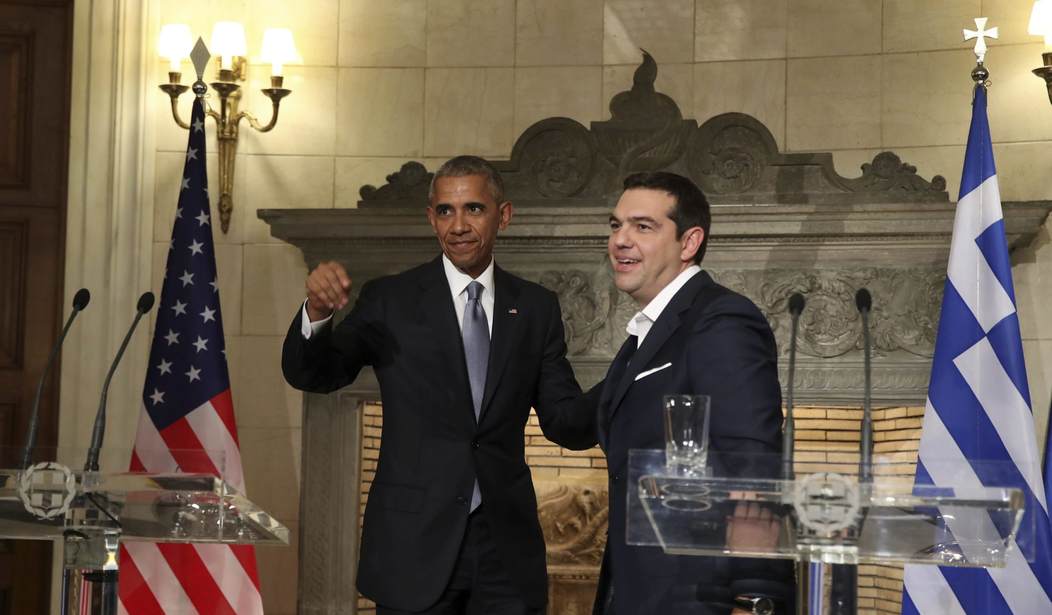While in Greece today, President Obama warned against a “rise in a crude sort of nationalism” in the United States after this election.
At a news conference in Athens, Greek Prime Minister Alexis Tsipras thanked Obama for “choosing Athens, the birthplace of democracy, for one of his last stops before concluding his eight-year term as the American president.”
Tsipras said he and Obama are discussing “challenges” within the fabric of Europe “that need to be dealt with collectively, decisively and effectively — otherwise, we will be led backwards from a political and a social point of view.”
The prime minister called the “increasing trend in skepticism and inward-looking” attitudes “a threat to modern democracies.”
Obama mentioned the Greek debt crisis — which “has had a very concrete and devastating impact on the lives and livelihoods of millions” — and said Tsipras outlined the next steps in their meeting, “including reforms to make Greece more attractive to investment and to prevent the kind of imbalances that led to the debt crisis in the first place.”
The president also thanked Greece “for their humanitarian response to the crisis of so many migrants and refugees seeking safety in Europe.”
“Greeks, especially on the islands, have shown extraordinary compassion and they’ve rightly earned the admiration of the world. Again, Greeks have done so even as they faced their own great economic hardships. And that’s a testament, I think, to their solidarity and commitment to treating people with kindness and fairness,” he said.
In taking questions from reporters, Obama addressed how “presidential elections always turn on personalities, they turn on how campaigns are run, they turn on natural desires for change.”
“Globalization combined with technology, combined with social media and constant information, have disrupted people’s lives sometimes in very concrete ways; a manufacturing plant closes and suddenly an entire town no longer has what was the primary source of employment,” he said. “But also psychologically, people are less certain of their national identities or their place in the world. It starts looking different and disorienting. And there is no doubt that that has produced populist movements both from the left and from the right in many countries in Europe.”
Obama said he was “of course” in tune with voters’ frustration and anger in part “because of the fact that you’ve seen some of the rhetoric among Republican elected officials and activists and media.”
“Some of it, pretty troubling and not necessarily connected to facts, but being used effectively to mobilize people,” he added. “And obviously, President-elect Trump tapped into that particular strain within the Republican Party and then was able to broaden that enough and get enough votes to win the election.”
He stressed that “last I checked, a pretty healthy majority of the American people agree with my world view on a whole bunch of things.”
“Sometimes people just feel as if we want to try something to see if we can shake things up,” Obama continued. “And that, I suspect, was a significant phenomenon. I do believe, separate and apart from any particular election or movement, that we are going to have to guard against a rise in a crude sort of nationalism or ethnic identity or tribalism that is built around an us and a them. And I will never apologize for saying that the future of humanity and the future of the world is going to be defined by what we have in common as opposed to those things that separate us and ultimately lead us into conflict.”
“Take Europe. We know what happens when Europeans start dividing themselves up and emphasizing their differences and seeing a competition between various countries in a zero sum way. The 20th Century was a bloodbath, and for all the frustrations and failures of the project to unify Europe, the last five decades have been periods of unprecedented peace, growth, and prosperity in Europe. And the United States, we know what happens when we start dividing ourselves along lines of race or religion or ethnicity.”
Obama called division “dangerous, not just for the minority groups that are subjected to that kind of discrimination or, in some cases in the past violence, but because we then don’t realize our potential as a country when we’re preventing blacks or Latinos or Asians or gays or women from fully participating in the project of building American life.”
“So my vision’s right on that issue. And it may not always win the day in the short term in any particular political circumstance,” he added. “But I’m confident it will win the day over the long term because societies in which we are able to unify ourselves around values and ideals and character and how we treat each other and cooperation and innovation, ultimately are gonna be more successful than societies that don’t.”
Tsipras said he knows “very little of Donald Trump — I got to know his aggressive manner and the manner in which he defended some unconventional points of view during the election period.”
“Those who believe that if someone who would want to radically change the foreign policy of a country such as the United States, which is very difficult, and often although some of us in here who may fear that this may happen, what we should be doing is build bridges, not walls,” the prime minister said.









Join the conversation as a VIP Member